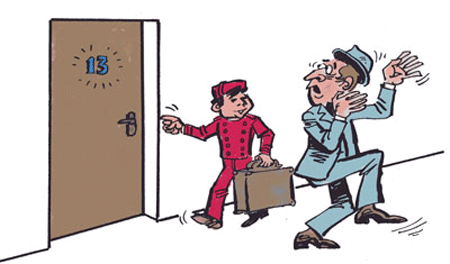miso-, mis-, -misia
(Greek: hate, hater, hatred; disgust for; revulsion of; contempt for; abhorrence of)
Don't confuse this miso-, mis- unit with the following units: mis-, "bad, wrong"; miss-, -miss, -mis- "send, throw".
1. A hostility about speaking or arguing: One patient, with catatonic schizophrenia, had a misologia which convinced her to remain mute so the world would not be destroyed as a result of her speaking.
2. An aversion or hatred of talking or of mental activity: Working on this dictionary requires a lot of intellectual thinking and creative writing; nothing for those who would rather spend most of their time with passive activities like watching TV, DVDs or existing with a condition of misologia!
2. An aversion or hatred of talking or of mental activity: Working on this dictionary requires a lot of intellectual thinking and creative writing; nothing for those who would rather spend most of their time with passive activities like watching TV, DVDs or existing with a condition of misologia!
A process that involves an excessive amount of talking and discussion which aggravates those who want to have immediate solutions for problems: Too many politicians are guilty of misologisms as they keep coming up with arguments for, or against, passing some legislative bill and going on and on with accusations, untruths, and exaggerations


Congress is so strange. A man gets up to speak and says nothing. Nobody listens, then everybody disagrees.
1. A despiser of excessive discussions or of arguments: Several misologists, among other staff members of the school, loathed sitting in meetings for hours listening to long drawn-out discourses which seemed to have no end and no results.
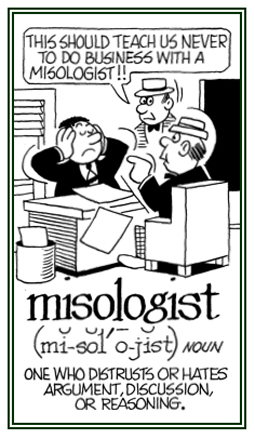
© ALL rights are reserved.
Go to this Word A Day Revisited Index
Is it possible that there are husbands and wives who divorced each other because they were misologists?
A misologist can also be a person of action who prefers to plunge ahead to accomplish something instead of talking about it so much.
2. A hater of over reasoning or critical comments: As a young pre-teenager, Larry became a misologist because he never wanted to listen to his parents trying to explain why he was not allowed to do the same things as grown-ups, like staying up late or watching crime movies on TV.
Go to this Word A Day Revisited Index
so you can see more of Mickey Bach's cartoons.
A distrust of talking or arguing with anyone at any time: Ivan was a misologue with catatonic schizophrenia, which is characterized by abnormal behavior, and so he would not speak because he was afraid that the world would be destroyed if he were to talk out loud.
A hatred of quarrels, contentions, or disputes: Young Becky had an aversion to asking her parents for things she wanted because they were always trying to get her to justify why she felt that she needed them; and so, a condition of misology had developed over the years.
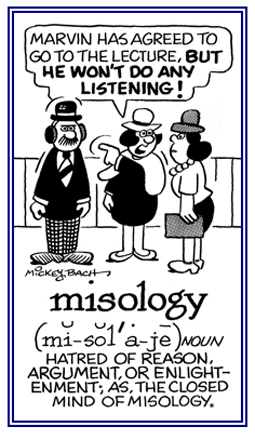
© ALL rights are reserved.
Go to this Word A Day Revisited Index

Go to this Word A Day Revisited Index
so you can see more of Mickey Bach's cartoons.
A mental condition consisting of delusions of being rejected and repulsed by everyone: Since Mark was psychologically possessed by misomania, he hated everyone and everything.
1. In psychiatry, a person who is suffering with the mental delusion of persecution and hatred: Jake decided to see a doctor because he had a feeling that his supervisor despised him and wanted to control his work more than his colleagues’, although his co-workers tried to convince him of the opposite; so, he thought he must have the symptoms of a misomaniac!
2. Someone who hates everyone and everything: As a child, Jeremy grew up in a difficult family situation and felt that his parents were always against him, no matter what he did; so, he had a real grudge and bitterness towards them and, as a result, his psychologist said he probably has become a misomaniac.
2. Someone who hates everyone and everything: As a child, Jeremy grew up in a difficult family situation and felt that his parents were always against him, no matter what he did; so, he had a real grudge and bitterness towards them and, as a result, his psychologist said he probably has become a misomaniac.
A person who has hostility or animosity towards his or her mother: Stuart’s experiences with his father were absolutely great while growing up, but not with his mother who had wished that she didn’t have a son and told him so; therefore, it wasn’t surprising that he turned out to be a misomater and had to go to a psychiatrist for help.
A hater of mathematics and or science: Susan was superb in geography, but very poor in arithmetic and everything having to do with numbers; so, she accepted the fact that she was a misomath, and decided never to work in a bank nor any other place where she would have to be proficient with numbers!
1. Antipathy towards learning: Toby loved to play football with his friends, and when it came to do his homework, he was a misomathy, hating to memorize facts and writing essays for school or even just reading books!
2. A hatred of mathematics or of learning the subject: Diane knew she was very poor at adding and subtracting and she abhorred having to go to the blackboard in front of the classroom and do calculations; so, she accepted the fact that she was a misomathy and decided to drop the class as soon as possible.
2. A hatred of mathematics or of learning the subject: Diane knew she was very poor at adding and subtracting and she abhorred having to go to the blackboard in front of the classroom and do calculations; so, she accepted the fact that she was a misomathy and decided to drop the class as soon as possible.
1. An active opponent to culture as expressed in writing by the German dramatist Hanns Johst in 1933: It is assumed that Milan Kundera coined the word misomusist in Czech, which was then taken into English.
2. Etymology: from Greek misos, "hatred" + mousa, "learning" which is also the source of the name of the nine muses of Greek and Roman mythology who represented the arts and sciences.
1. An intolerance of anything that is unfamiliar or someone who is against having any new trends or changes: One example of misoneism has been shown by Hans who always went out to eat with his wife only at a German restaurant where he always ate "Schnitzel" with sauerkraut; and he never went to Mexican, Chinese, or any other foreign restaurants because he always felt that the food was too strange for him to consider.
2. Etymology: from Greek miso-, "hate" + neos, "new".
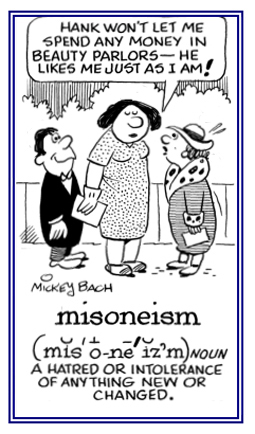
© ALL rights are reserved.
Go to this Word A Day Revisited Index
2. Etymology: from Greek miso-, "hate" + neos, "new".

Go to this Word A Day Revisited Index
so you can see more of Mickey Bach's cartoons.
1. Someone who avoids changes and who has a dislike of new subjects, events, or people: Linda didn't want to be like her parents, who had a tendency to be misoneists, because they were always doing the same things every day, but she wanted to travel to new places, go to rock concerts, and to attend parties and meet new people.
2. A hater of novelties or new things: Marie was a misoneist who was completely happy with her old record player and landline; and so, she told her friends that she was not interested in getting the "newfangled" gadgets which would cost too much and break down anyway.
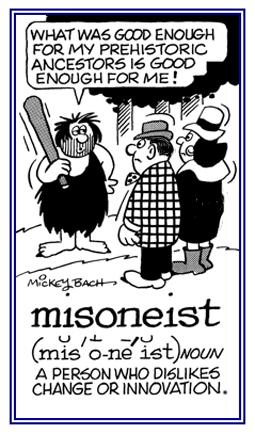
© ALL rights are reserved.
Go to this Word A Day Revisited Index
2. A hater of novelties or new things: Marie was a misoneist who was completely happy with her old record player and landline; and so, she told her friends that she was not interested in getting the "newfangled" gadgets which would cost too much and break down anyway.

Go to this Word A Day Revisited Index
so you can see more of Mickey Bach's cartoons.
misoneistic (adjective), more misoneistic, most misoneistic
A reference to the person who wants to stay away from new situations or activities and strangers: Jane liked living by herself in her condo, going to the same grocery store she had always gone to, and talking to the same neighbors who lived in the same building for as long as she had, and so, she didn’t want or need any other type of excitement and considered herself to be a misoeistic person and that was fine with her!
A fear or hatred of having to deal with numbers or a specific number: Wilfred had a special misonumeral for the number 13 and so he didn't want anything to do with that number anytime or at any place.
